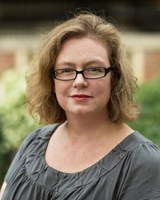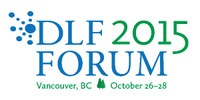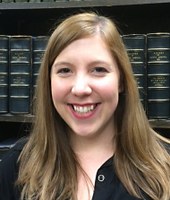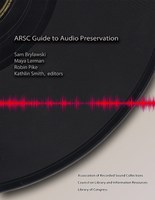
Number 104 • March/April 2015
ISSN 1944-7639 (online version)
Contents
The Migration of NITLE to CLIR
Four Questions with Bethany Nowviskie
DLF Forum Call for Proposals Now Open
First iFellows Named in New Doctoral Fellowship Program Supporting Committee on Coherence at Scale
Kelly Grogg Awarded 2015 Rovelstad Scholarship
Guide to Audio Preservation Forthcoming
CLIR Names 2015 Mellon Dissertation Fellows
CLIR Issues is produced in electronic format only. To receive the newsletter electronically, please sign up at https://www.clir.org/pubs/issues/signup.html. Content is not copyrighted and can be freely distributed.
The Migration of NITLE to CLIR
—By Chuck Henry
A recent article in Inside Higher Education described the planned migration of the National Institute for Technology in Liberal Education (NITLE) to CLIR. Like any major decision, the decision for NITLE to leave its current home at Southwestern University involved numerous conversations, meetings, and quieter moments of reflection; this brief essay outlines the various themes and issues that framed these conversations.
Alignment of Mission
CLIR and NITLE share a variety of programmatic interests, and the values and methods of NITLE align with CLIR and the Digital Library Federation (DLF). NITLE’s approach to its programs and constituents—to build and maintain effective collaborations that can achieve greater efficiencies and productivity among liberal arts colleges and universities than would be possible with institutions working individually—is the core concept underpinning CLIR’s Coherence at Scale for Higher Education program. It is also an essential tenet of our national digitization of special collections initiative. While the future of NITLE is uncertain—questions pertain to its mission, membership appeal, and market—we felt strongly that the accomplishments of NITLE and its potential invigoration are worth our mutual exploration and engagement.
NITLE’s History of Intellectual Productivity
Over the years, NITLE has created a suite of assets that CLIR will continue to promote and augment. Shared Practice is a viable template, as is the Collaboration Toolkit. The Academic Commons is a fine concept and would similarly be employed in service to NITLE’s members. The NITLE web page will be jointly maintained by Southwestern University and CLIR for the foreseeable future. The web presence will invariably need to be refreshed and improved over time. Other features and applications will be considered in consultation with NITLE members and advisors.
What CLIR will Provide
A national platform. CLIR will provide NITLE with a national and international platform, exposing NITLE to a wide audience and potential collaborators; CLIR has an excellent publication department and can give NITLE access to many varieties of communication mechanisms, supporting its Academic Commons, blogs, research publications, toolkits, and future applications. CLIR, like NITLE, has worked closely with the Mellon Foundation and will continue to explore areas of mutual interest and grant proposals.
Many of the areas of interest and focus groups in DLF also align with NITLE’s interest. The Forum will be made available for NITLE presentations, panels, discussions, and other means to reach out and promote its work. CLIR has a robust group of CIOs, now numbering over 30 members, that meet twice annually and discuss topics of current importance. Several of the CIOs, all of whom are in charge of blended IT and library organizations on their campuses, are current or former NITLE members and will be consulted routinely when NITLE comes to CLIR.
A rigorous analysis and assessment. NITLE’s legacy will be foundational for reinvigorating and reimagining its future. One of the first responsibilities CLIR will undertake on behalf of NITLE is a rigorous assessment of its first 15 years as a means to ground recommendations on how it might evolve in the years ahead. NITLE was founded in 2001, and any organization focused on technology in the first years of the twenty-first century will necessarily have a good, evolving story to tell. NITLE has been through a number of iterations, from its time at Ithaka Harbors through its period at Southwestern University. CLIR will conduct surveys, interviews, and assessments to determine the strengths and challenges to NITLE over the years, and to ask of its current and past members and advisors what specific programs and focus NITLE might undertake going forward: how to build thoughtfully on this legacy.
One of CLIR’s strengths is the postdoctoral fellowship program. Started more than a decade ago, the program provides opportunities for postdocs to work in a university or college library for two years. The current fellows and alumni/ae of this program now number over 100 talented, engaged professionals, many of whom continue to work in libraries, and many who are tenure track scholars. Selected fellows will undertake this survey of NITLE members, the results of which should help inform decisions about the organization’s direction and future.
As an aspect of this assessment, several face-to-face meetings with current NITLE members will be convened. We are also in discussion with Southwestern about an annual symposium focused on the concept of collaboration: common barriers to successful collaboration and the kinds of strategies that can be deployed to address these barriers. NITLE would anchor this symposium.
A Promising Future
Looking ahead, the talent and expertise of NITLE’s membership, its history and assets, and the willingness of its constituency to experiment and partner should position NITLE favorably as it seeks to manage and enrich the complex digital environment of higher education. Our conversations with members and the assessment itself will highlight the areas of greatest promise.
An interesting avenue for exploration will be ways in which NITLE can contribute to some of the goals articulated in the new strategic vision of The Andrew W. Mellon Foundation. The new vision, especially the section titled Higher Education and Scholarship in the Humanities, outlines several areas of focus pertinent to NITLE. These include the foundation’s support of programs that scale up training for humanistic engagement with digital resources and applications; assistance to less well-endowed liberal arts colleges in planning for their intellectual and financial future; research on broad structural questions in higher education; and funding of collaborations among research universities, liberal arts colleges, and other cultural and educational institutions in their communities. NITLE’s record of accomplishment touches each of these focal points in varying degrees. And the Mellon Foundation’s new strategic vision is explicitly collaborative: NITLE could provide leadership, institutional participants, and a framework in the execution of this vision.
As this merger moves forward, CLIR can promise a working environment in which assumptions and possible avenues of development are rigorously tested, widely consulted, and respectfully administered.
 Four Questions with Bethany Nowviskie
Four Questions with Bethany Nowviskie
Last week, the CLIR staff welcomed Bethany Nowviskie on her first day as director of the Digital Library Federation. She graciously took time to answer a few questions from CLIR Issues Editor Kathlin Smith.
Q: Why do we need a DLF?
It’s a tricky time for libraries and other data-sharing and cultural heritage organizations. At the same moment that we’re realizing unprecedented opportunities for integrating and opening up our collections — making them interoperable, accessible to new audiences, and ready for new uses — we also face political and economic forces that can work against those goals. Austerity says: think small, focus on your local, paying customers and on short-term returns on investment. DLF is here to say: think expansively, work for the very long term, and above all, work together.
Q: What attracted you most about the position, and what do you want to achieve?
That last answer may have said it all! It was the chance to take DLF ever farther as a vector for our member organizations and their staff to work inter-institutionally and at scale. But I was also reminded at last year’s Forum how much I love the pragmatic, dedicated community of practitioners, themselves, who come together through DLF: just the overall mindset — these are people who get things done — and the honesty, collaborative ethos, and serious, deep expertise on display at the Forum. If I can help them use DLF to its absolute fullest capacity to achieve the things they want to do, I’ll be very happy.
Q: How do you think the DLF community will change in the next few years?
Membership in DLF grew past all expectation under my fantastic predecessor, Rachel Frick, and is continuing with the hard work of Louisa Kwasigroch (thanks, Rachel and Louisa!).
With so much fresh energy, it’s been particularly exciting to see whole new subsets of the community come into focus—as with the huge upsurge in members from liberal arts colleges, who will be holding a pre-conference this year before the Forum in Vancouver. (They’ve invited me to emcee a kind of “game show” they’re planning for one afternoon session, so I’m suddenly in the market for hair gel and a shiny suit.) Both the Taiga Forum and CLIR postdoctoral fellows have been timing their meetings to get together at DLF, and there were more participants from museums and digital humanities labs and centers at last year’s Forum, too.
DLF now stands at 115 member institutions, with active interest groups in areas like e-research, project management, and new ways of assessing the value of digital libraries. I predict we’ll see more of these community-led working groups and initiatives forming, with good, public, shared outcomes from them all.
Q: You’ve been on the job for four days. Any surprises?
It’s the sheer breadth and interconnectedness of CLIR’s and DLF’s programs! I thought I had a pretty good handle on the contributions CLIR makes to libraries, cultural institutions, and higher ed, and I thought I knew what DLF was up to, on behalf of its members. But I’m finding both that there’s far more work of great value going on than I realized—lots of new initiatives that will bear fruit in the coming years—and that everything happening through CLIR and DLF is very smartly integrated and interdependent.
We’ve long said that DLF is, for CLIR, “the place where strategy informs practice.” Well, that’s a two-way street—and even more, it’s an ongoing, rich, collaborative endeavor.
DLF Forum Call for Proposals Now Open
The Digital Library Federation is now accepting proposals for the 2015 DLF Forum program. Proposals are sought within the broad framework of digital collections, infrastructure, resources, and organizational priorities. It is not necessary to be part of a member organization to submit a proposal.
The DLF Forum is an annual meeting where the digital library community comes together to discover better methods of working through sharing and collaboration. It serves as a resource and catalyst among digital library developers, project managers, and all who are invested in digital library issues.
 The Forum traditionally has no overarching theme so that the program can speak to current issues of interest to the community. Contributors are encouraged to focus proposals on action-oriented topics targeted toward a practitioner audience, considering the aspects of design, management, implementation, assessment, and collaboration.
The Forum traditionally has no overarching theme so that the program can speak to current issues of interest to the community. Contributors are encouraged to focus proposals on action-oriented topics targeted toward a practitioner audience, considering the aspects of design, management, implementation, assessment, and collaboration.
Suggested topical areas for 2015 include:
- Linked data implementations
- Collaborative digital projects across GLAM institutions
- Innovative approaches to engaging users and reusing data and collections (e.g., data visualization, mapping, crowdsourcing, citizen science)
- Systems architecture, both hardware and code
- Open data, open access, or open educational resources
This is not a prescriptive list; we encourage you to be creative, collaborative, and collegial.
Proposals are due June 22. For more information and to submit your proposal, please visit https://www.diglib.org/dlf-events/2015forum/cfp/.
The call for proposals for the DLF Liberal Arts Colleges Preconference is also open until June 22.
The 2015 Forum will be held in Vancouver, British Columbia, October 26-28.
First iFellows Named in New Doctoral Fellowship Program Supporting Committee on Coherence at Scale
The University of Pittsburgh’s School of Information Sciences (iSchool) has named the first two iFellows under the new doctoral fellowship program for information science students that will support research for the Committee on Coherence at Scale for Higher Education. Timothy Schultz, PhD student at Drexel University’s iSchool, and Wei Jeng, PhD student at the University of Pittsburgh’s iSchool, were selected as the first iFellows from a competitive pool of applicants. Students from each of the 55 iSchools with membership in the international iSchools consortium were invited to submit proposals in the spring of 2014.
The newly named iFellows are committed to working with CLIR, the Committee on Coherence at Scale, and the iSchools organization on a shared mission to coordinate and aggregate national-scale digital projects. The aim is to promote the development of new technology environments to support advanced scholarship across disciplines, and to further the information sciences field as a whole. The iFellows will focus their independent PhD dissertation research on addressing an aspect of this goal. Each will each receive a stipend of $50,000 over a two-year period to support their highly-specialized research.
 Timothy Schultz’s research will dive into the world of “big data” as it pertains to collaborating, visualizing, and sharing information in the medical industry. He is particularly interested in developing novel approaches to extracting clinical trial data, merging it with actual clinical observations, and then displaying this pairing though graph-based visualizations to help identify promising treatment approaches. According to Schultz, “The goal is to unlock the information found within these documents to further elucidate the historical evolution of key therapeutic spaces, such as Alzheimer’s disease,” to provide researchers a better understanding of complex diseases.
Timothy Schultz’s research will dive into the world of “big data” as it pertains to collaborating, visualizing, and sharing information in the medical industry. He is particularly interested in developing novel approaches to extracting clinical trial data, merging it with actual clinical observations, and then displaying this pairing though graph-based visualizations to help identify promising treatment approaches. According to Schultz, “The goal is to unlock the information found within these documents to further elucidate the historical evolution of key therapeutic spaces, such as Alzheimer’s disease,” to provide researchers a better understanding of complex diseases.
Schultz has a passion for combining technology with helping people, as his informatics work on developing diagnostics tools to screen asymptomatic people for Alzheimer’s disease shows. “When a family member was diagnosed with Alzheimer’s disease, the research became incredibly personal,” he explains. He notes that it is an “incredibly humbling experience to see the positive impacts technology can have in our world.” Being named an iFellow means that Shultz can continue his informatics research and work within the Alzheimer’s therapeutic space, until, as he puts it, “we find a cure.”
 Wei Jeng’s research will focus on her interest in information sharing, with an emphasis on investigating how scholars communicate and share research data with one another. She hopes to “develop a broad understanding of the nature of scholarly virtual collaboration and data sharing behaviors in academic communities, and leverage this understanding to provide insights into academic librarianship as well as scholarly communication.”
Wei Jeng’s research will focus on her interest in information sharing, with an emphasis on investigating how scholars communicate and share research data with one another. She hopes to “develop a broad understanding of the nature of scholarly virtual collaboration and data sharing behaviors in academic communities, and leverage this understanding to provide insights into academic librarianship as well as scholarly communication.”
Wei Jeng has been exploring library and information science topics since her undergraduate studies in Taiwan, where she discovered her love of “hidden patterns and contexts between humans, information, and technology that went beyond implementations and applications in computer systems.” Her passion in this area led her to pursue an IT specialization during her master’s degree studies (MLIS), which she has carried forward into her library and information sciences research as a PhD student. She points to her multidisciplinary background as “an asset” as she continues her current doctoral research on scholarly collaboration. As an iFellow, she will continue to study the data sharing practices of scholars and the implications that such practices may have on academia and education as a whole.
The fellowship program has been funded by an award from The Andrew W. Mellon Foundation, and will ultimately support 10 iFellows in total. Additional iFellows will be selected in the coming years, with the next application cycle beginning in summer of 2015. This doctoral fellowship program was developed by two members of the University of Pittsburgh’s iSchool faculty, Dean Ronald L. Larsen and Mellon Cyberscholar and Visiting Professor Stephen Griffin, in collaboration with the Committee on Coherence at Scale.
 Kelly Grogg Awarded 2015 Rovelstad Scholarship
Kelly Grogg Awarded 2015 Rovelstad Scholarship
Kelly Grogg, a library and information sciences student at the University of Iowa, has been selected to receive this year’s Rovelstad Scholarship in International Librarianship.
Grogg spent two years teaching at a rural high school in Cambodia through the United States Peace Corps. On her own initiative, she arranged for a large donation of books to the school’s library with the promise of a trained librarian and open access for the students. “I was able to witness how a rural village was transformed by the access to information they were granted through this small library. It was this experience that ignited an inescapable desire to pursue a career in developing information access throughout the world.”
Grogg has a B.A. in English Literature from the University of Iowa and works as a graduate research assistant in Special Collections and University Archives.
The Rovelstad Scholarship provides travel funds for a student of library and information science to attend the annual meeting of the World Library and Information Congress, which takes place in Cape Town, South Africa, in August this year.
 Guide to Audio Preservation Forthcoming
Guide to Audio Preservation Forthcoming
A forthcoming volume from CLIR, in partnership with the Association for Recorded Sound Collections and Library of Congress, will provide basic guidance on the preservation of audio formats.
The ARSC Guide to Audio Preservation has been written for institutions and individuals that have sound recordings in their collections but lack professional expertise in one or more areas to preserve them.
Chapters cover concepts of audio conservation and preservation, recorded sound formats and their associated risks, appraisal, related copyright issues, and disaster preparedness. The guide also offers advice on how to make informed decisions about digitization, as well as strategies for managing digital content.
The guide will be available in print in late May or early June.
CLIR Names 2015 Mellon Dissertation Fellows
Sixteen graduate students have been selected to receive awards this year under the Mellon Fellowships for Dissertation Research in Original Sources, which CLIR administers.
The fellowships are intended to help graduate students in the humanities and related social science fields pursue research wherever relevant sources are available; gain skill and creativity in using primary source materials in libraries, archives, museums, and related repositories; and provide suggestions to CLIR about how such source materials can be made more accessible and useful.
The fellowships carry stipends of up to $25,000 each to support dissertation research for periods ranging from nine to twelve months.
Jessica Arnett
University of Minnesota
Between Empires and Frontiers: Alaska Native Sovereignty and U.S. Settler Imperialism
Tania Bhattacharyya
Columbia University
Bombay, 1839–1932: Empire, Space, and Orders of Belonging in an Indian Ocean Port City
Antawan Byrd
Northwestern University
Interferences: Sound, Technology, and the Politics of Listening in Afro-Atlantic Art
Andrew Campana*
Harvard University
Poetry Across Media in 20th-Century Japan
Lucia Carminati
University of Arizona
Across the Mediterranean, 1863–1919: Italian Working-Class Migrants in Egypt and Practices of Cosmopolitanism
Emilie Connolly
New York University
Indian Trust Funds and the Routes of American Capitalism, 1795–1865
Mackenzie Cooley
Stanford University
Engineering the Animal: Breeding and the Quest to Perfect the Renaissance Body, 1450–1600
Lara Fabian
University of Pennsylvania
Between East, West, and the Steppe: The South Caucasus as the Northeastern Roman Borderland
Diana Garvin
Cornell University
All-Consuming: Food, Gender, and Power in Fascist Italy, 1922–1945
Elaine LaFay
University of Pennsylvania
Atmospheric Bodies: Medicine, Meteorology, and the Cultivation of Place in the Antebellum Gulf South
Jesse Lockard
The University of Chicago
A City Is Not a Picture: Yona Friedman, Megastructuralism and the Estrangement of Art and Architecture
Meekyung MacMurdie
University of Chicago
Geometric Medicine: Aniconism and Medieval Arab Painting
Ron Makleff
University of California, Berkeley
Monuments of Information: The Archives of State Formation in Northern Europe, c. 1380–1880
Chelsea Schields
The Graduate Center, City University of New York
Closer Ties: The Dutch Caribbean and the Aftermath of Empire, 1942–2012
Joohee Suh
Washington University in St. Louis
The Afterlife of Corpses: Dead Bodies, Ecology, and the Qing Culture of the Macabre in North China (1644–1911)
Andrew Welton
University of Florida
Forging Entanglements: The Spear in Early Medieval English Society

